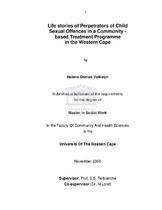| dc.description.abstract | In this thesis, the researcher explored the life stories of male perpetrators of child
sexual offences. It is argued that this is an area that needs to be addressed because sexual abuse of children has become a global problem, and South Africa is no exception. As in other parts of the world, in South Africa, sexual abuse of children is under reported.It is estimated that only fifteen percent of rapes are reported, and in addition to this only about one in twenty rapes is reported to the police. Sexual abuse has become a great concern to social workers and health practitioners because of the harmful consequences for victims.This study aimed to undertake an exploratory study on sex offenders’ subjective reflections (constructions) of their involvement in the sexual molestation of children. Narratology or narrative analysis enabled the researcher to find out how the offenders portray their sexual engagement with children.The researcher followed the qualitative research approach, utilizing the autobiographical method of inquiry. Data collection was by means of narratives /story-telling. The researcher made use of purposive sampling in the selection of seven participants for the individual interviews and thirty for the focus group interviews. The participants were perpetrators of sexual abuse against children, participating in a community-based program in the Western Cape. Personal interviews were conducted because of the sensitive nature of the information sought.Data was analysed according to an adapted five-step process as proposed by Terreblanche and Durrheim (2006). Data was verified by using the peer review; rich,thick descriptions; external audits; and clarifying research bias, as suggested by Creswell (1998: 197-204).The findings revealed that the offenders’ stories unfolded chronologically, starting from their early childhood. They shared their family life experiences and happenings during their growth to adulthood. The various factors, which exposed and influenced
them on the path to becoming adult child sexual offenders were explored. | en_US |

